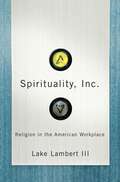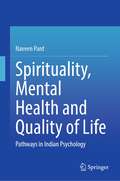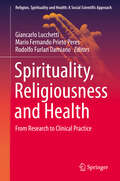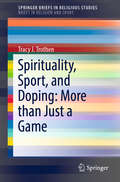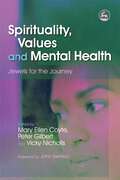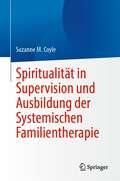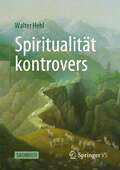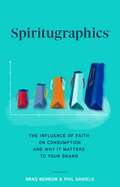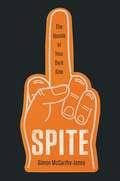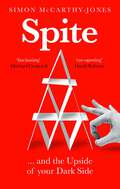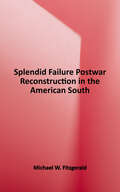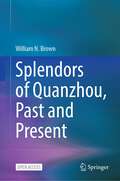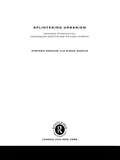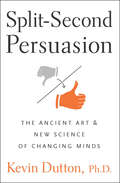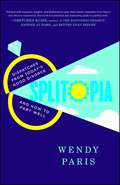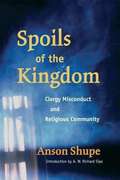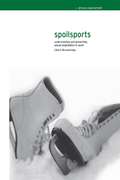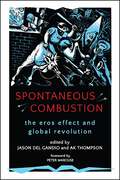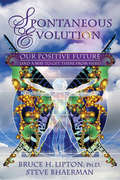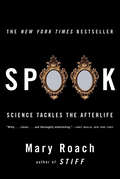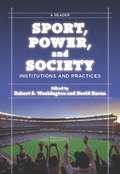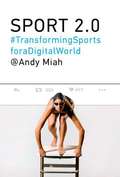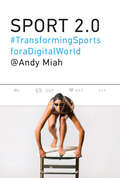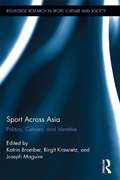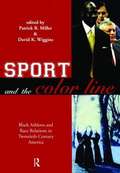- Table View
- List View
Spirituality, Inc.: Religion in the American Workplace
by Lake Lambert IIIFor many Americans spirituality and business seem to be polar opposites: one is concerned with lofty questions of ultimate significance, the other with mundane matters of the daily grind. Yet over the last two decades the two have become increasingly linked, and as the barriers between them are broken down, many see this as a revolutionary shift in American business culture.Lake Lambert III provides a comprehensive examination of the workplace spirituality movement, and explores how it is both shaping and being shaped by American business culture. Situating the phenomenon in an historical context, Lambert surveys the role of spirituality in business from medieval guilds to industrial "company towns" right up to current trends in the ever-changing contemporary business environment. Using case studies from specific businesses, such as Chick-fil-A and Hobby Lobby, he analyzes the enhanced benefits and support that workplace spirituality offers to employees, while exposing the conflicts it engenders, including diversity, religious freedom, and discrimination issues.The American workplace today is experiencing dramatic upheaval and change. Spirituality, Inc. offers important insights into the role of religion in this transformation. With employees seeking new ways to strike a proper life-work balance and find meaning in their everyday lives, spirituality in the workplace is a trend that will become increasingly important in the American business landscape. Spirituality, Inc. provides a critical overview of this phenomenon that does not ignore the movement's many positive contributions to the workplace, yet does not overlook the potential for abuse.
Spirituality, Mental Health and Quality of Life: Pathways in Indian Psychology
by Naveen PantThis book is about spiritual intelligence and its effects on mental health and quality of life. As mental health and related problems are increasing rapidly and have become a matter of great concern, there has not been a unanimous and empirical approach to assess and cure it, due to its divergence or other causes. This book is based on the most developed construct: spiritual intelligence and its effects on mental health and quality of life. Spirituality and its other constructs are one of the most interesting topics nowadays in the area of positive/indigenous/transpersonal psychology and among social/behavioral scientists. This book provides content on spirituality, spiritual intelligence, mental health, and quality of life. The book also attempts to review related literature (whether review or empirical), to have a look at past and current scenarios on spirituality and mental health and quality of life research. Through an exploration of Indian indigenous psychology, this book provides a look at mental health and the mind from an Indian psychological perspective and examines Indian psychology, taking into consideration modern psychological concepts.
Spirituality, Religiousness and Health: From Research to Clinical Practice (Religion, Spirituality and Health: A Social Scientific Approach #4)
by Giancarlo Lucchetti Mario Fernando Prieto Peres Rodolfo Furlan DamianoThis book provides an overview of the research on spirituality, religiousness and health, including the most important studies, conceptualization, instruments for measurement, types of studies, challenges, and criticisms. It covers essential information on the influence of spirituality and religiousness (S/R) in mental and physical health, and provides guidance for its use in clinical practice. The book discusses the clinical implications of the research findings, including ethical issues, medical/health education, how to take a spiritual history, and challenges in addressing these issues, all based on studies showing the results of incorporating S/R in clinical practice. It contains case reports to facilitate learning, and suggests educational strategies to facilitate teaching S/R to health professionals and students.
Spirituality, Sport, and Doping: More than Just a Game (SpringerBriefs in Religious Studies)
by Tracy J. TrothenThis book explores the deeper meaning of sports. Drawing on contemporary research, the author makes a strong case for why we should see sport not only in terms of religion but--more importantly-as a possible location for spiritual meaning. Taking this a step farther, she considers how gene editing, robotics, and other biomedical technological enhancements affect not only sports performances but experiences of sport as sacred. In addition, the author explores what difference it might make to the enhancement debate if sports’ spirituality is taken seriously. The author is not afraid to explore the issue in all its complexity. Yet, the argument she presents is both meaningful and accessible. This investigation applies insights from Christian theology, applied ethics, psychology, and sports studies. From lightweight tennis racquets to anabolic steroids, athletes have long used technology and science to improve their performances. But, until now, no one has asked how biomedical technological enhancements might affect the undervalued spiritual dimension of sport. This book presents rich insights into the connection between sports, spirituality, and human enhancement technologies. It will appeal to researchers, athletes and sports followers, and undergraduate and graduate students in ethics, sport, religion or theology.
Spirituality, Values and Mental Health: Jewels for the Journey
by David Mitchell Andrew Powell Brian Thorne John Swinton Neil Thompson Sarah Carr Peter Gilbert Nigel Mills Azim Kidwai John Foskett Suman Fernando Fozia Sarwar Premila Trevedi Choman Hardi Vicky Nicholls Peter Bates Fatima Kassam Arthur Hawes Cameron Langlands Veronica Dewan Ju Blencowe Julia Head Tom Gordon Frances Basset B Spalek Anne Roberts Paul Grey Mark Bones Ali Jan Haider Barbara Pointon Mary Ellen Coyte Kim Woodbridge Wendy Edwards Christopher Newell Chris Mackenna Abina Parshad-Griffin Thurstine Basset Sarajane Aris Luftha Meah Paul Chapple Bill K. W. M. FulfordSpirituality, religious belief and inclusive faith communities are important for mental well being but mental health practitioners have few guidelines for acknowledging these issues when working with service users. Spirituality, Values and Mental Health gathers together personal and professional contributions from mental health professionals, carers and mental health service users and survivors. It addresses the stigma that can surround both mental health and spirituality and explores the place of the spiritual in mental health care, teasing out its implications for research, education, training and good practice. This book is a welcome source of ideas and common-sense that is essential reading for mental health practitioners, carers and service users, chaplains, faith leaders, faith communities, as well as students and professionals working in the field of spirituality and mental health.
Spiritualität in Supervision und Ausbildung der Systemischen Familientherapie
by Suzanne M. CoyleIn diesem Buch werden die Auswirkungen der Erforschung der Spiritualität durch die Linse der menschlichen Beziehungen untersucht. Es befasst sich mit systemischer Supervision und Ausbildung und erforscht einen systemischen Ansatz zur Entwicklung des Selbst. Das Buch bietet eine pädagogische Methodik, die eine Grundlage für die Beschreibung eines operativen Modells der Spiritualität schafft, das sowohl für theistische als auch für nicht-theistische Perspektiven geeignet ist. Darüber hinaus wird detailliert dargelegt, wie Spiritualität selbst eine Vielfalt ist, und Spiritualität wird durch die Linse der Vielfalt erforscht. Darüber hinaus veranschaulicht ein Pilotforschungsprojekt zum Thema Spiritualität in einer MFT-Live-Supervisionsgruppe, wie ein systemischer Ansatz auf Spiritualität angewendet werden kann. Schließlich bietet das Buch Beispiele für die praktische Anwendung von Spiritualität in verschiedenen Ausbildungssituationen.Zu den wichtigsten Themenbereichen gehören:- Wie ein systemischer Ansatz zur Spiritualität die Linse der Beziehung und der Vielfalt ermöglicht, um die Supervision und die Lehre der Familientherapie zu bereichern, die aus dem Selbst der Therapeuten hervorgeht.- Theoretische Perspektiven, die systemische Praxis mit Spiritualität in einem Ansatz für Familientherapie verbinden.- Wie ein systemischer spiritueller Ansatz in der Ausbildung von Ehe- und Familientherapeuten eingesetzt werden kann.- Interventionen, die sich darauf konzentrieren, wie ein relationaler systemischer Ansatz Transzendenz und Immanenz sowohl aus klinischer als auch aus spiritueller Perspektive betrachtet.- Konzepte, die in die Supervision und Ausbildung einfließen, mit dem Ziel, die Studierenden zu spiritueller Kompetenz und spiritueller Sensibilität zu erziehen.- Hindernisse bei der Umsetzung dieses Ansatzes mit Beispielen, wie solche Hindernisse angegangen werden können.Spiritualität in der systemischen Familientherapie-Supervision und -Ausbildung ist ein unverzichtbares Hilfsmittel für Forscher, Professoren, Doktoranden sowie Kliniker, Supervisoren und Fachleute in den Bereichen klinische Psychologie, Familienstudien/Familientherapie und öffentliches Gesundheitswesen sowie in allen damit verbundenen Disziplinen.
Spiritualität kontrovers
by Walter HehlDas Buch versucht einen fairen Blick auf Spiritualität und Spirituelles aus Sicht der Physik und der modernen Geistesauffassung. So vieles soll spirituell sein, aber was ist es wirklich? Es gibt Aberglauben, Betrug und Illusionen einerseits und moderne Wissenschaft andererseits. Die Wissenschaft zeigt, was Geist ist, dass es unendlich Großes und unendlich Kleines gibt, dass wir so Vieles berechnen können - aber es bleibt das Mysteriöse. Manches in der Wissenschaft ist unmittelbar spirituell, etwa die Figuren von Lichtenberg und Chladni im 18. Jahrhundert und die Kirlian-Fotographie und Tesla-Kugeln heute. Vieles verstehen wir nur oberflächlich. Wenn es der Computer versteht und wir nicht, können wir nicht zufrieden sein. Die Grenzen des Wissens sind weit nach außen verschoben, aber wir sind klein geblieben. Wir stoßen an Grenzen und begegnen Spirituellem: im Unendlichen, im Unausweichlichen und im Unfassbaren. Diese Grenzen sollten uns demütig machen. Die moderne Wissenschaft zeigt diese Grenzen auf. Die Spiritualität ist dann eher die Erfahrung des Mysteriösen des Physikers Albert Einstein. Es gibt Spirituelles, etwa wie eh und je den Anblick des Sternenhimmels oder des Ozeans. Auch heute sind Orte wie Stonehenge spirituelle Plätze oder Kraftörter. Der Magnetismus im Elektrofahrzeug ist so spirituell wie im Magnetstein der Antike. Besonders spirituell ist die Verbindung der Natur mit der Mathematik.
Spiritugraphics: The Influence of Faith on Consumption and Why It Matters to Your Brand
by Brad Benbow Phil DanielsIn Spiritugraphics, authors Brad Benbow and Phil Daniels explore, through research and case studies on some of the top brands and companies, the question of whether or not faith influences consumption and to what extent it influences our day-to-day purchasing decisions with the goal of helping companies reach this deeply connected segment of the marketplace. Does a person&’s faith affect what they buy and don&’t buy? What about where they make their purchases? Are consumers shopping differently today versus three to five years ago? These and other key questions were posed to women of all age groups in a national behavioral study executed by America&’s Research Group between December 2020 and January 2021. In Brad Benbow and Phil Daniels&’ groundbreaking book, Spiritugraphics: The Influence of Faith on Consumption and Why It Matters to Your Brand, you will discover keen insights into topics important to marketers like: How much does &“Made in America&” affect shoppers of faith? In spite of current culture change, political correctness and consequences of expressing diverse thought, 42.4% of female Christians in the US say that &“American-made&” is very important. Does &“holiday&” vs. &“Christmas&” really matter to people of faith? According to the research, 60% stated that any retailer promoting &“Christmas&” rather than &“Holiday&” (or other references) had a significant advantage with them compared to their competitors. Marketers and brand managers have long operated under the framework of demographics, psychographics, and sociographics. Authors Benbow and Daniels present a new set of data points to be considered: Spiritugraphics. Ultimately the book provides ten key &“Spiritugraphics&” that you and your company/brand should pay close attention to if you want to reach this highly engaged and deeply connected segment of the marketplace.
Spite: The Upside of Your Dark Side
by Simon McCarthy-JonesSpite angers and enrages us, but it also keeps us honest. In this provocative account, a psychologist examines how petty vengeance explains human thriving. Spite seems utterly useless. You don't gain anything by hurting yourself just so you can hurt someone else. So why hasn't evolution weeded out all the spiteful people? <P><P> As psychologist Simon McCarthy-Jones argues, spite seems pointless because we're looking at it wrong. Spite isn't just what we feel when a car cuts us off or when a partner cheats. It's what we feel when we want to punish a bad act simply because it was bad. Spite is our fairness instinct, an innate resistance to exploitation, and it is one of the building blocks of human civilization. <P><P>As McCarthy-Jones explains, some of history's most important developments—the rise of religions, governments, and even moral codes—were actually redirections of spiteful impulses. A provocative, engaging read, Spite shows that if you really want to understand what makes us human, you can't just look at noble ideas like altruism and cooperation. You need to understand our darker impulses as well.
Spite: and the Upside of Your Dark Side
by Simon McCarthy-JonesHave you ever done something stupid, dangerous or self-sabotaging just to get one over someone else? Most of us have. Simon McCarthy-Jones draws on psychology, current affairs, literature and genetics to illuminate – whether we admit it or not – our spiteful side. What is that part of us that secretly wants our friends to fail? Did Americans put Trump in the White House just to stick it to Hillary Clinton? And then there are the legion of stories about toxic behaviour in supermarkets and over the privet hedge, ramping up to incendiary divorces, vicious business practices, backbiting politics and scorched-earth terrorism. There&’s a hopeful message too – the upside of our dark side. Spite can drive us forward, and Simon provides a fresh perspective on the concept by showing the evolutionary benefits of spite as a social leveller, an enabler of defiance, a wellspring of freedom and a vital weapon in our everyday armoury.
Splendid Failure: Postwar Reconstruction in the American South (American Ways Ser.)
by Michael W. FitzgeraldSince the civil rights era of the 1960s, revisionist historians have been sympathetic to the racial justice motivations of the Radical Republican Reconstruction policies that followed the Civil War. But this emphasis on positive goals and accomplishments has obscured the role of the Republicans in the overthrow of their own program. Rich with insight, Michael W. Fitzgerald's new interpretation of Reconstruction shows how the internal dynamics of this first freedom movement played into the hands of white racist reactionaries in the South. Splendid Failure recounts how postwar financial missteps and other governance problems quickly soured idealistic Northerners on the practical consequences of the Radical Republican plan, and set the stage for the explosion that swept Southern Republicans from power and resulted in Northern acquiescence to the bloody repression of voting rights. The failed strategy offers a chastening example to present-day proponents of racial equality.
Splendors of Quanzhou, Past and Present
by William N. BrownThis open access book explores the past and present of Quanzhou (Zayton) and the rich diversity and tolerance that kindled Quanzhou’s innovativeness and helped it prosper both commercially and culturally—values that are today being embraced by China’s global trade partners. Quanzhou (Zayton), Marco Polo’s port of departure and Columbus’ goal in China, was not only the start of the Maritime Silk Road and the Middle Age’s greatest port but also centuries ahead of its time in its tolerance and diversity. The fabled “City of Light” had 7 mosques for its 40,000 Muslims, some of whom served in government, as well as 3 Franciscan cathedrals funded in part by the emperor, Jewish synagogues, and centers for Nestorian Christians, Hindus, Taoists, Manicheans, Jains, etc. As Franciscan Bishop Andrew of Perugia wrote in 1322, “Tis a fact that in this vast empire, there are people of every nation under heaven, and every sect, and all and sundry are allowed to live freely according to their creed.” In 2021, UNESCO designated “Quanzhou, Emporium of the World,” as a world heritage site, and the city is now the hub of the Belt and Road Initiative, the 21st Century Silk Road, which was inspired by ancient Quanzhou.
Splintering Urbanism: Networked Infrastructures, Technological Mobilities and the Urban Condition
by Steve Graham Simon MarvinSplintering Urbanism makes an international and interdisciplinary analysis of the complex interactions between infrastructure networks and urban spaces. It delivers a new and powerful way of understanding contemporary urban change, bringing together discussions about:*globalization and the city*technology and society*urban space and urban networks*infrastructure and the built environment*developed, developing and post-communist worlds.With a range of case studies, illustrations and boxed examples, from New York to Jakarta, Johannesberg to Manila and Sao Paolo to Melbourne, Splintering Urbanism demonstrates the latest social, urban and technological theories, which give us an understanding of our contemporary metropolis.
Split-Second Persuasion: The Ancient Art and New Science of Changing Minds
by Kevin DuttonAn &“entertaining&” look at the psychology and neuroscience behind the act of influencing others (Kirkus Reviews). People try to persuade us every day. From the news to the Internet to coworkers and family, everyone and everything wants to influence our thoughts in some way. And in turn, we hope to persuade others. Understanding the dynamics of persuasion can help us to achieve our own goals—and resist being manipulated by those who don&’t necessarily have our best interests at heart. Psychologist Kevin Dutton has identified a powerful strain of immediate, instinctual persuasion, a method of influence that allows people to disarm skepticism, win arguments, and close deals. With a combination of astute methods and in-depth research in the fields of psychology and neuroscience, Dutton&’s fascinating and provocative book: Introduces the natural super-persuaders in our midst: Buddhist monks, magicians, advertisers, con men, hostage negotiators, and even psychopaths.Reveals which hidden pathways in the brain lead us to believe something even when we know it&’s not true.Explains how group dynamics can make us more tolerant or deepen our extremism.Illuminates the five elements of SPICE (simplicity, perceived self-interest, incongruity, confidence, and empathy) for instantly effective persuasion. &“[Split-Second Persuasion] offers some powerful insights into the art and science of getting people to do what you want.&” —New Scientist
Splitopia: Dispatches from Today's Good Divorce and How to Part Well
by Wendy ParisEngaging and groundbreaking, Splitopia challenges outdated, negative assumptions about divorce with sharp wit, searing honesty, rigorous research, and intimate interviews, and offers guidance for healthier, happier splits. When Wendy Paris announced that she and her husband were separating, friends forecast a tsunami of devastation—for both of them and their child. But as Paris would discover, divorce has improved dramatically in recent decades, due to changes in laws and family structures, advances in psychology and child development, and a new understanding of the importance of the father. Yet disapprobation and fear persist. In this incisive book, Paris cuts through the moralizing and myopia, and explores the new cultural phenomenon of the “good” divorce. Splitopia chronicles Paris’s own divorce in real time; shares insights from happily divorced couples, international experts, and the latest research; and follows her own divorced parents’ possible reunion. Splitopia calls for a more flexible view of how we wed and how we part, and offers support for creating loving families, whatever the legal relationship status. Divorce is no one’s first choice, but as with other difficult, unwanted experiences, it can lead to growth, deeper connections, and a more fulfilled life.
Spoils of the Kingdom: Clergy Misconduct and Religious Community
by Anson Shupe A. W. SipeIn Spoils of the Kingdom, Anson Shupe investigates clergy misconduct as it has recently unfolded across five faith-based groups. Looking at episodes of abuse in the Roman Catholic, Mormon, African American Protestant, white Evangelical Protestant, and First Nations communities, Spoils of the Kingdom tackles hard questions not only about the sexual abuse of women and children, but also about economic frauds perpetrated by church leaders (including embezzlement, mis-represented missions, and outright theft) as well as cases of excessively authoritarian control of members' health, lifestyles, employment, and politics. Drawing on case evidence, Shupe employs classical and modern social exchange theories to explain the institutional dynamics of clergy misconduct. He argues that there is an implicit contract of reciprocity and compliance between congregants and religious leaders that, when amplified by the charismatic awe often associated with religious authorities, can lead to misconduct.
Spoilsports: Understanding and Preventing Sexual Exploitation in Sport (Ethics and Sport)
by Celia BrackenridgeSexual exploitation in sport is a problem that has beset both male and female athletes privately for decades but which has only recently emerged as a public issue. Spoilsports is the first comprehensive review of this issue, integrating pioneering academic research, theoretical perspectives, and practical guidelines for performers, coaches, administrators and policy-makers.Key topics include:* 'moral panic'* children's rights* masculinity and power* making and implementing policy* leadership in sport.Spoilsports draws extensively on the personal experiences of athletes and those involved in sport. Challenging and controversial, this book represents an important step towards tackling a difficult issue. It is essential reading for coaches, athletes, parents, policy-makers and all those with a personal or professional interest in sport.
Spontaneous Combustion: The Eros Effect and Global Revolution (SUNY series, Praxis: Theory in Action)
by Jason Del Gandio; AK Thompson; Peter MarcuseFrom the events of May 1968 to the Arab Spring and Occupy, we have seen social movements develop spontaneously around the globe propelling thousands and, at times, millions of people into the streets to demand an end to oppression."In order to make sense of such events, the authors draw on George Katsiaficas's conception of the 'eros effect,' which picks up and takes off from concepts developed by Herbert Marcuse. This effect describes moments in which the instinctual human need for justice and freedom undergoes a massive spontaneous awakening. Drawing on Marcuse, the concept foregrounds the instinctual foundation of the desire for freedom, in which a biologically-based pleasure drive—eros—is given free play." — from the Foreword by Peter MarcuseHowever, even as the eros effect provides a valuable framework for understanding spontaneous global uprisings, Katsiaficas has acknowledged that the concept has remained underdeveloped. Spontaneous Combustion provides an introduction to the eros effect along with a series of elaborations, applications, and critical rejoinders concerning its implications. A truly interdisciplinary venture, the book features contributions from cutting-edge scholars and activists on the frontlines of today's struggles.
Spontaneous Evolution: Our Positive Future (and A Way To Get There From Here)
by Bruce H. Lipton Steve BhaermanWe’ve all heard stories of people who’ve experienced seemingly miraculous recoveries from illness, but can the same thing happen for our world? According to pioneering biologist Bruce H. Lipton, it’s not only possible, it’s already occurring. In Spontaneous Evolution, this world-renowned expert in the emerging science of epigenetics reveals how our changing understanding of biology will help us navigate this turbulent period in our planet’s history and how each of us can participate in this global shift. In collaboration with political philosopher Steve Bhaerman, Dr. Lipton invites readers to reconsider the "unquestionable" pillars of biology, including random evolution, survival of the fittest, and the role of DNA; the relationship between mind and matter; how our beliefs about nature and human nature shape our politics, culture, and individual lives; and how each of us can become planetary "stem cells" supporting the health and growth of our world. By questioning the old beliefs that got us to where we are today and keep us stuck in the status quo, we can trigger the spontaneous evolution of our species that will usher in a brighter future.
Spook: Science Tackles the Afterlife
by Mary RoachThe best-selling author of Stiff and Bonk trains her considerable wit and curiosity on the human soul. "What happens when we die? Does the light just go out and that's that—the million-year nap? Or will some part of my personality, my me-ness persist? What will that feel like? What will I do all day? Is there a place to plug in my lap-top?" In an attempt to find out, Mary Roach brings her tireless curiosity to bear on an array of contemporary and historical soul-searchers: scientists, schemers, engineers, mediums, all trying to prove (or disprove) that life goes on after we die.
Sport Power and Society
by Robert E. Washington David KarenA new reader that illuminates the complex interaction of sports and society and incorporates an engaging interdisciplinary mix of academic perspectives and popular journalism
Sport 2.0: Transforming Sports for a Digital World
by Andy MiahDigital technology is changing everything about modern sports. Athletes and coaches rely on digital data to monitor and enhance performance. Officials use tracking systems to augment their judgment in what is an increasingly superhuman field of play. Spectators tune in to live sports through social media, or even through virtual reality. Audiences now act as citizen journalists whose collective shared data expands the places in which we consume sports news. In Sport 2.0, Andy Miah examines the convergence of sports and digital cultures, examining not only how it affects our participation in sport but also how it changes our experience of life online. This convegence redefines how we think of about our bodies, the social function of sports, and the kinds of people who are playing. Miah describes a world in which the rise of competitive computer game playing -- e-sports -- challenges and invigorates the social mandate. Miah also looks at the Olympic Games as an exemplar of digital innovation in sports, and offers a detailed look at the social media footprint of the 2012 London Games, discussing how organizers, sponsors, media, and activists responded to the world's largest media event. In the end, Miah does not argue that physical activity will cease to be central to sports, or that digital corporeality will replace the nondigital version. Rather, he provides a road map for how sports will become mixed-reality experiences and abandon the duality of physical and digital.
Sport 2.0: Transforming Sports for a Digital World (The\mit Press Ser.)
by Andy MiahRamifications of the convergence of sports and digital technology, from athlete and spectator experience to the role of media innovation at the Olympics.Digital technology is changing everything about modern sports. Athletes and coaches rely on digital data to monitor and enhance performance. Officials use tracking systems to augment their judgment in what is an increasingly superhuman field of play. Spectators tune in to live sports through social media, or even through virtual reality. Audiences now act as citizen journalists whose collective shared data expands the places in which we consume sports news. In Sport 2.0, Andy Miah examines the convergence of sports and digital cultures, examining not only how it affects our participation in sport but also how it changes our experience of life online. This convergence redefines how we think of about our bodies, the social function of sports, and the kinds of people who are playing. Miah describes a world in which the rise of competitive computer game playing—e-sports—challenges and invigorates the social mandate. Miah also looks at the Olympic Games as an exemplar of digital innovation in sports, and offers a detailed look at the social media footprint of the 2012 London Games, discussing how organizers, sponsors, media, and activists responded to the world's largest media event.In the end, Miah does not argue that physical activity will cease to be central to sports, or that digital corporeality will replace the nondigital version. Rather, he provides a road map for how sports will become mixed-reality experiences and abandon the duality of physical and digital.
Sport Across Asia: Politics, Cultures, and Identities (Routledge Research in Sport, Culture and Society #21)
by Joseph Maguire Katrin Bromber Birgit KrawietzThis book is designed to reflect both our current knowledge regarding sport, globalisation and ‘"encounters" with several important "post-colonial" or non-western societies and to draw together scholars from a range of different disciplines. Case studies of cultural encounters in Central, South-East Asia, Asia Minor and the Arabian peninsula capture the paradoxical processes of emulation, resistance and transformation that are at work in the diffusion and development of "sport" and body cultures. These case studies bring together insights from anthropology, cultural studies, geography, history, law, sociology, various area and post-colonial studies.
Sport And The Color Line: Black Athletes And Race Relations In Twentieth-Century America
by Patrick Miller David WigginsThe year 2003 marks the one-hundredth anniversary of W.E.B. Du Bois' "Souls of Black Folk," in which he declared that "the color line" would be the problem of the twentieth century. Half a century later, Jackie Robinson would display his remarkable athletic skills in "baseball's great experiment." Now, "Sport and the Color Line" takes a look at the last century through the lens of sports and race, drawing together articles by many of the leading figures in Sport Studies to address the African American experience and the history of race relations. <P><P> The history of African Americans in sport is not simple, and it certainly did not begin in 1947 when Jackie Robinson first donned a Brooklyn Dodgers uniform. The essays presented here examine the complexity of black American sports culture, from the organization of semi-pro baseball and athletic programs at historically black colleges and universities, to the careers of individual stars such as Jack Johnson and Joe Louis, to the challenges faced by black women in sports. <P><P>What are today's black athletes doing in the aftermath of desegregation, or with the legacy of Muhammad Ali's political stance? The essays gathered here engage such issues, as well as the paradoxes of corporate sport and the persistence of scientific racism in the athletic realm.
